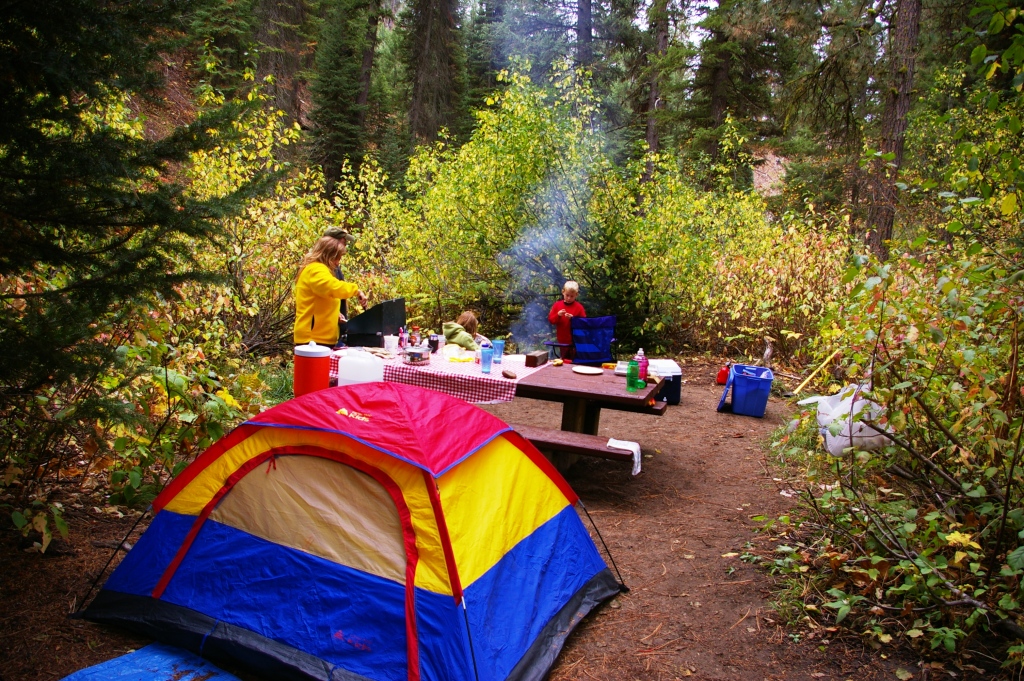Responsible Recreation
National forests and grasslands are ours to enjoy now. We want them to be enjoyed for future generations as well. So is it up to all of us to care of these natural resources. This means we can all enjoy the recreational activities of our choosing, but do it responsibly.
Camp responsibly
 Creating new campsites kills vegetation and leads to soil erosion. If possible, use an existing site, or pick a site where vegetation is absent.
Creating new campsites kills vegetation and leads to soil erosion. If possible, use an existing site, or pick a site where vegetation is absent.- Keep campsites small.
- Pick a spot where vegetation is absent.
- Never dig a trench or build a tent platform.
- Respect living trees. By carving or chopping into the trunks of trees, people unknowingly damage the tree by slitting veins right below the bark. These veins transport nutrients and water throughout the tree. If the damage becomes severe, it will deprive the tree of nutrients and food, and the tree slowly starves to death.
- Choose your campsite, park your car and wash at least 200 feet from rivers, streams, lakes or wetlands.
- Use biodegradable soap or plain water when washing.
Answering nature’s call
Bacteria and viruses found in human feces are known to cause hepatitis, salmonella, giardia, and other gastro-intestinal diseases. Remember, the water in the rivers and lakes you visit may flow into your own drinking water supply. Please follow these simple steps if a public restroom is not available:
- Find a spot at least 200 feet from any water source.
- Dig a hole 6-8 inches deep and bury human waste.
- Pack out used toilet paper and feminine products. Animals will dig up those products and scatter them around the area.
- Several types of waste-disposal products are on the market that come with enzymes that immediately begin breaking down solid waste.
- A leak-proof portable toilet or other self-contained receptacle is another option.
Be fire safe
- Keep fires small and bring firewood purchased in the local area. Firewood brought from another area could also bring invasive pests.
- If you have to collect firewood at your campsite, collect dead and down wood only.
- Check at the local ranger station for current fire restrictions, which can change on a daily, sometimes hourly, basis.
- Use existing fire rings. Scrape away litter and any other burnable material within a 10-foot-diameter surrounding the ring.
- Make sure all wood fits inside the fire ring. Do not feed a large log into the fire ring.
- Have a shovel, axe, and bucket of water available before lighting your campfire.
- Never leave a campfire unattended, even for a few minutes or even if there are no flames present. Many wildfires start because of abandoned fires or because someone thought a fire was out.
- Put out a campfire by slowly pouring water onto the fire and stirring with a shovel. Continue adding and stirring until all material is cool to touch.
- Do not bury your fire. The coals can smolder and re-ignite.
Keep forest creatures wild
- Do not approach or follow wildlife—observe from a distance.
- Avoid wildlife during sensitive times: mating, nesting, raising young, or winter.
- Leash your dog to keep it and wildlife safe.
- Do not feed wildlife—let them feed themselves. Store your rations and trash safely, securely, and out of reach.
Do not spread invasive weeds
Invasive weeds can rapidly displace native plant species that provide habitat for wildlife and food for people and livestock. Here’s how you can help reduce their spread:
- Learn to recognize common weed species.
- Don’t camp or drive in weed infested areas.
- Don’t pick the flowers of noxious weeds and take them home — you’ll spread seeds.
- When using pack animals, carry only feed that is certified weed-free. Within 96 hours before entering backcountry areas, feed them only weed-free food.
- Wash your vehicle, including the undercarriage, to remove any weed seed before driving to the forest.
Don't erase the traces of America's past
- Archaeological, historic and sacred sites hold clues to America’s past. If disturbed, a part of our heritage may be lost forever.
- Disturbing such sites on federal lands is illegal and can result in substantial penalties.
- Help us protect these sites and contact your nearest district ranger to report illegal activity.
Be considerate of others
- Respect other visitors and protect the quality of their outdoor experience.
- Be courteous. Yield to other users on the trail.
- Step to the downhill side of the trail when encountering pack stock.
- Take breaks and camp away from trails and other visitors.
- Let nature's sounds prevail. Avoid loud voices and noises.
Learn more about how to enjoy the outdoors responsibly though our partners, Leave No Trace Center for Outdoor Ethics.
Remember: You are responsible for your own safety and for the safety of those around you.
